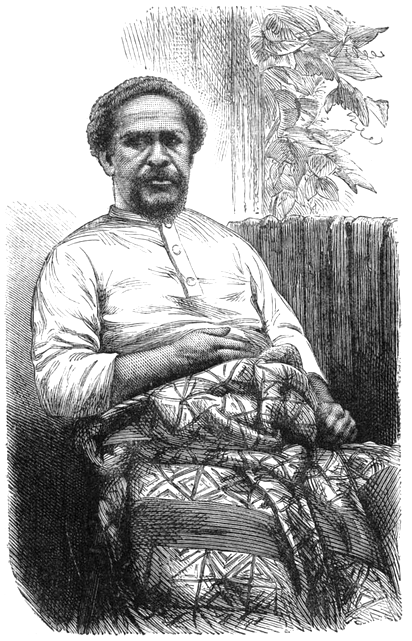DANIEL AFU (Fiji, 1873)
In our Fijian Mission there are new 634 chapels and 354 other preaching places, making in all 988, or nearly a thousand pulpits to supply every Sunday. What are called our paid agents in Fiji, are paid by the Fijian Churches and not by the Missionary Society. It is a principle in our Fijian Mission to make this native agency self-sustaining. In addition to a large number of local preachers, who are called “unpaid agents,” we have 883 catechists and 52 Native Ministers, who “preach the Word” in the Fijian tongue. God has greatly blessed these native preachers and given them fruit to their labours. In our Class Meetings and Lovefeasts it is astonishing to find how many attribute their conversion instrumentally, to the sermons of native preachers. They have great power in sympathy, in local illustration, and can follow the Fijian mind in all its twistings. They are generally fluent and impassioned speakers; and after careful training become “workmen that do not need to be ashamed,” –and of whom we, as a Church, have no need to be ashamed, “rightly dividing the Word of Life.”

Daniel Afu, whose portrait is given you in this number, is one of the best of our native ministers in Fiji. He was ordained nearly ten years ago, and had long been useful as a catechist, before he entered the ranks of the ministry. He is a Tongan by birth, and is one of many Friendly Islanders that live and labour for the salvation of Fiji. He is a strong advocate of total abstinence from intoxicating liquors; and would condemn smoking by a Missionary in the most polite and gentlemanly manner, but as boldly as he would condemn it in young native local preachers. He is frank and fearless; and on hearing that some brandy had been shipped on the “John Wesley” he protested at the District Meeting against the Mission Ship being made “unclean.” On hearing the explanation, that the brandy was part of the baggage of one of the passengers, he said, “If the Mission Ship cannot bring passengers without such baggage, let both passengers and their baggage be left to other ships, and keep our own ship clean of that which is the curse of Fiji.” The Committee in Sydney respected the bold protest of the native Minister, and the captain of the “John Wesley” received instructions to allow no spirits to be taken on board the Mission Ship as freight or passengers’ luggage. Daniel has always been a leading spirit among our native agents, and happy is the Missionary who has Daniel for a colleague. He will see that the instructions of the Missionary are carried out in every school and chapel in the Circuit. He is what is often called a “generally useful,” man. He can preach a good sermon, or steer a canoe through a difficult passage. He can give a lesson clearly in the school or do the work of the architect and builder combined in building and beautifying our large new churches. Some of the best native churches in Fiji were built under his supervision. He is in his day-school or teaching dress in the portrait given. He has a powerful voice and his appearance gives you the idea of combined mental and physical strength. He is now stationed at Rewa, where he has been very successful.
Daniel Afu, The Wesleyan Juvenile Offering, Vol. 7, 1873, p. 114-116.
Background: In the 1830s, Tonga had undergone a Christian revival. Tonga was now sending Christian missionaries out to surrounding nations – like Daniel Afu to Fiji.